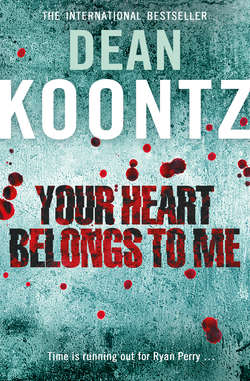Читать книгу Your Heart Belongs to Me - Dean Koontz - Страница 10
ОглавлениеFOUR
The alarm-clock feature on the TV had been set for seven in the morning. The volume remained low, and Ryan woke slowly to murmuring voices, to music scored for drama.
The glow from the screen did not fully relieve the darkness. As the value of light changed in a scene and as figures moved, phantoms throbbed and flickered through the bedroom.
Ryan lay on the floor, in the fetal position, facing the screen. William Holden, many years after Sunset Boulevard, was in an intense conversation with a lovely young woman.
In thirty-four years, Ryan had experienced only two hangovers, but he seemed to be suffering a third. Headache. Eyes crusted shut, vision blurry. Dry, sour mouth.
Initially he could not recall the events of the previous evening or remember what possessed him to go to sleep on the floor.
Curiously, the mystery of his circumstances intrigued him less than the events on the television: the older man, the younger woman, worried talk of war. …
The once-sharp edges of his mind were worn, his thoughts a shapeless stream of quicksilver. Even when his vision cleared, he couldn’t follow the movie or grasp the character relationships.
Yet he felt compelled to watch, haunted by the feeling that he had awakened to this movie not by accident but by the design of Fate. Here to be deciphered was a warning about his future that he must understand if he were to save himself.
This extraordinary conviction grew until he was impelled to rise to his knees, to his feet. He moved closer to the large TV.
As the fine hairs prickled on the nape of his neck, his heart quickened. The thudding in his breast knocked into memory the much more furious pounding to which he had awakened in the night, and abruptly he recalled every detail of the terrifying seizure.
He turned away from the TV, switched on a lamp. He stared at his trembling hands, closed them into fists, opened them once more, half expecting some degree of paralysis, but finding none.
In his bathroom, black granite, gold onyx, and stainless steel were reflected in a wilderness of mirrors. An infinite line of Ryan Perrys faced him, all of them gray and haggard and grim with dread.
As never before, he was aware of the skull beneath the skin, each curve and plane and hollow of bone, the perpetual death’s-head grin concealed behind every expression that his face assumed.
Shaved, showered, and dressed, Ryan found his estate manager, Lee Ting, in the garage.
This large subterranean space provided eighteen parking stalls. The ceiling was ten feet high, to accommodate delivery trucks and—if he should ever want one—a motor home.
Golden ceramic tile, a kind used in automobile showrooms, paved the floor. Glossy white tile covered the walls. The brightwork on the Woodie and other classic vehicles sparkled in the beams of pin spots.
Ryan had always before thought the garage was beautiful, even elegant. Now the cold tile reminded him of a mausoleum.
In the corner workshop, Lee Ting was polishing a custom-made license-plate frame for one of the cars.
He was a small man but strong. He appeared to be cast from bronze not yet patinaed, and prominent veins swelled in his hands.
At fifty, his life was defined by parenthood denied, his hope of family thwarted. Kay Ting twice conceived, but a subsequent uterine infection left her sterile.
Their first child had been a daughter. At the age of two, she died of influenza. Their second, a son, was also gone.
The sight of certain young children elicited from them the most tender smiles, even as their eyes glistened with the memory of loss.
When the power buffer clicked off, Ryan said, “Lee, do you have a staff meeting this morning or appointments with anyone?”
Surprised, Lee turned. His face brightened, his chin lifted, and a cheerful expectation came into him, as though nothing pleased him more than the opportunity to be of good service.
Ryan suspected this was in fact the case. All the strivings and the particular satisfactions of raising a family, denied to Lee, were now expressed in his job.
Putting aside the license-plate frame, Lee said, “Good morning, Mr. Perry. I have nothing scheduled that Kay can’t cover for me. What do you need?”
“I was hoping you could drive me to a doctor’s appointment.”
Concern diminished the arc of Lee’s smile. “Is something wrong, sir?”
“Nothing much. I just feel off, a little nauseous. I’d prefer not to drive myself.”
Most men of Ryan’s wealth employed a chauffeur. He loved cars too much to delegate his driving.
Lee Ting clearly knew this need for a driver was proof of more than mild nausea. He at once snared a key from the key safe and went with Ryan to the Mercedes S600.
A tenderness in Lee’s manner and a wounded expression in his eyes suggested that he regarded his boss as more than an employer. He was, after all, just old enough to have been Ryan’s father.
The twelve-cylinder Mercedes seemed to float on a cushion of air, and little road noise reached them. Although the sedan rode like a dream, Ryan knew that it carried him toward a nightmare.
